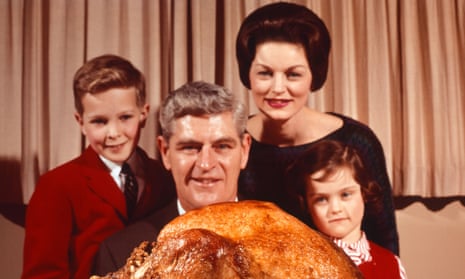It is only when you encounter other people’s holiday mythologies that the arbitrary and gross nature of your own become apparent. For a foreigner, Thanksgiving offers a particularly rich array of incomprehensible traditions – all those combinations of sweet and savoury, the 70s provenance of many of the dishes and the fetishisation of the turkey itself. What with that and the root vegetables, by 4pm on Thanksgiving afternoon, to the outsider it can all start to feel a bit Wicker Man – the creepy 1973 original, not the loveably camp Nic Cage remake.
I don’t claim to fully understand this American holiday – I have only lived in the US for seven years. But from my own experience of Christmas, I know too well the hysteria that can be brought on by deviating from the way things have always been done. There was, for instance, my dad’s heroic efforts one year, to suggest that we have steak instead of turkey on Christmas day, a well-meaning but egregious subversion of the first rule of the holidays: nothing is to change, ever. That includes the hour at which one eats, table settings, dress code, TV viewing, side dishes and whether or not you can set foot outside the house during the period of holiday lockdown. (The answer is, of course, always no.)
And then there’s the entertainment. At a friend’s house several years ago, I sat through the entire Macy’s Thanksgiving Day Parade, which was like watching three hours of commercials punctuated by a series of cold-looking women singing into a head wind, every one of whom might have been Kristin Chenoweth. In the nicest possible way, my hosts made it clear that no one present was allowed to go off and do something else for the duration of the spectacle.
For the non-American, the upside to these Thanksgiving rules is that you bring no baggage of your own to the party. You can laugh at the oddity of it all, enjoy the food and suffer the afternoon boredom without falling down the rabbit-hole of memory. If you’re lucky, you can probably even squeeze a crafty nap somewhere in there while someone else’s dysfunctional family rages around you.
And you can still understand the broad meaning of the holiday – not necessarily the business of giving thanks, but the sentimental attachment to dishes that cater to one’s pre-adult palate. Scientists should research this psychological phenomena – the deep comfort that comes from, in this case, green beans swimming in mushroom soup or things stuffed into other things accompanied by melted or mashed things that you wouldn’t dream of eating at any other time of the year.
“What’s that gray glue you guys eat?” an American friend asked me once, having experienced British hospitality around Christmastime. I was taken aback. It turned out that he was referring to bread sauce, a staple of the British holiday table. (A staple which must be bright white and made out of a packet, NOT made from scratch from actual bread crumbs. Ditto stuffing, which should be made of powder, water and a synthetic material you have never been able to identify.) My friend shook his head at the barbarity of the British and the next year, for my birthday, gave me a packet of Yorkshire pudding mix as a hilarious joke. “How wonderful that you people can find sustenance in a little envelope,” he said.
Nothing really changes – save this: “The only thing we ever learn to like is brussels sprouts,” a colleague told me last week. It strikes me as one of the great aphorisms, up there with “Ask not what your country can do for you...”
It’s true; sprouts are the one thing I’ve moved from the “hate” to the “like” category. But if I was American, I have a feeling I wouldn’t like sprouts on Thanksgiving the way I like them year round – which is to say deep fried, caramelised, or pan fried with bacon. Instead, I would want them to be put on to boil in late October, so that by the fourth Thursday of November they are reaching peak sprout, the soggy, yellowing vegetable of memory.
Thanksgiving, like any truly great holiday, provides a unique opportunity to reconnect with the person you once were – a finicky, probably quite sullen individual who awaits you at at your traditional place at the table, urging you to reject new items on the Thanksgiving menu. She serves as a reminder of how nice it is, after coming together, for everyone to go home at the end.

